Early this morning, the U.S. Supreme Court announced its decision on Arizona's anti-immigrant law, SB 1070. Today, more than sixty organizations comprising faith, law enforcement, civil rights, legal, labor, social service and political organizations united at a press conference to declare that San Diego rejects anti-immigrant, racial profiling laws like SB 1070.
Today's ruling supported that call, representing a strong rebuke to Arizona lawmakers who involved their state in immigration enforcement. The Court struck down three of the four Arizona provisions it considered, and merely said it was too early to tell if the fourth provision ("Show me your papers") is unconstitutional as well. Speakers at the press conference noted that today's decision should be viewed as a warning to policy makers across the country who may be considering whether to involve their state in this divisive issue.
The U.S. Supreme Court did not say that the "show me your papers" provision of SB 1070 is constitutional; it merely said it depends on how the Arizona courts interpret the language in the law, and how state law enforcement actually implements it. In all likelihood, either further proceedings in this case, or soon-to-be restarted proceedings in other cases (including the civil rights suit brought by the ACLU and others) could lead to another injunction to stop enforcement of the provision, Section 2B. The provision, however, should it be left to stand, marks a dangerous change in the structure of police power over our everyday lives. Fortunately, the Court cautions state authorities to tread carefully, and even invited further litigation to test the provision's constitutionality.
The failure of the Court to recognize the draconian nature of the "show me your papers" provision reveals that the Court remains out of touch with how such law enforcement tactics always lead to racial profiling and unfair detention of citizens and immigrants alike. It is quite frankly impossible to enforce laws like Section 2B without using race, color or ethnicity. The "show me your papers" law is inherently unequal in how it treats people, and the ACLU and its allies will ultimately prove this in court.
"The Arizona lesson is that laws like these harm business, undermine police work, and threaten our most basic American values," said Kevin Keenan, executive director of the ACLU of San Diego & Imperial Counties. "No matter what the Court says is permissible, the real hope is that the American people and communities everywhere will continue to reject the misguided Arizona approach to immigration."
Lawmakers in California have rightly refused to involve our state in this controversy, and today's ruling reinforces the wisdom of that decision. Not only did the U.S. Supreme Court strike down three major provisions of that law, but it expressed concerns that even the "show me your papers" section might very well be impossible to enforce in a manner that is not in conflict with federal law.
California is moving towards legislation that will protect immigrant communities. "In our state, we understand the importance of allowing local police to focus on public safety instead of federal immigration enforcement," Keenan said. "That's why the TRUST Act is making its way through the state legislature, putting California at the forefront of fair and reasonable immigration practices and far away from Arizona and its anti-immigrant laws."
The TRUST Act would change the way local law enforcement agencies participate in the controversial federal immigration program, Secure Communities. Under Secure Communities, law enforcement agents are required to share fingerprints of arrested individuals with U.S. Immigration and Customs Enforcement (ICE) to compare against its immigration databases. The TRUST Act would set a minimum standard for local governments not to submit to ICE's requests to detain people for deportation unless the individual has a serious or violent felony conviction. The legislation was written to guard against profiling and wrongful detention of citizens and crime victims and witnesses.
Read the Supreme Court's decision.
Read more about the ACLU's lawsuit.
Read statements from regional and state lawmakers.
See a list of San Diego County supporters and participants at today's press conference.
Un artiíulo en espanol sobre la decisión.
Conozca Sus Derechos: SB 1070 y el Tribunal Supremo [video].
Sign the pledge: I reject Racial Profiling.
Supreme Court Rejects 3 of 4 Provisions in Arizona's Anti-Immigrant Law
Related Issues
Related content
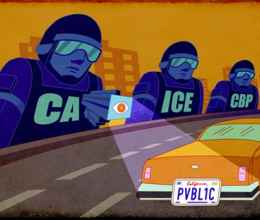
Lagleva et al. v. Doyle
October 14, 2021ACLU, Jewish Family Service Respond to OIG Review of U.S. Border...
July 26, 2021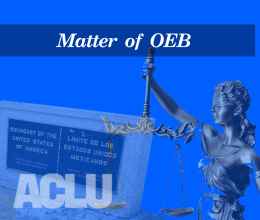
Matter of O.E.B.
May 25, 2021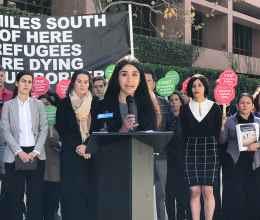
Immigrants’ Rights and Detention
August 13, 2020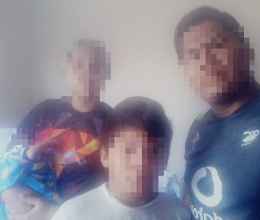
Jewish Family Service & ACLU File Complaint After DHS Expels...
July 10, 2020ACLU Statement on First Known Death from COVID-19 in ICE Detention
May 6, 2020
Suit Filed to Drastically Reduce Number of People in U.S. Marshals’...
April 24, 2020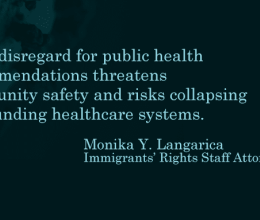
ACLU Sues for Drastic Reduction in Population of Overcrowded Otay...
April 21, 2020

